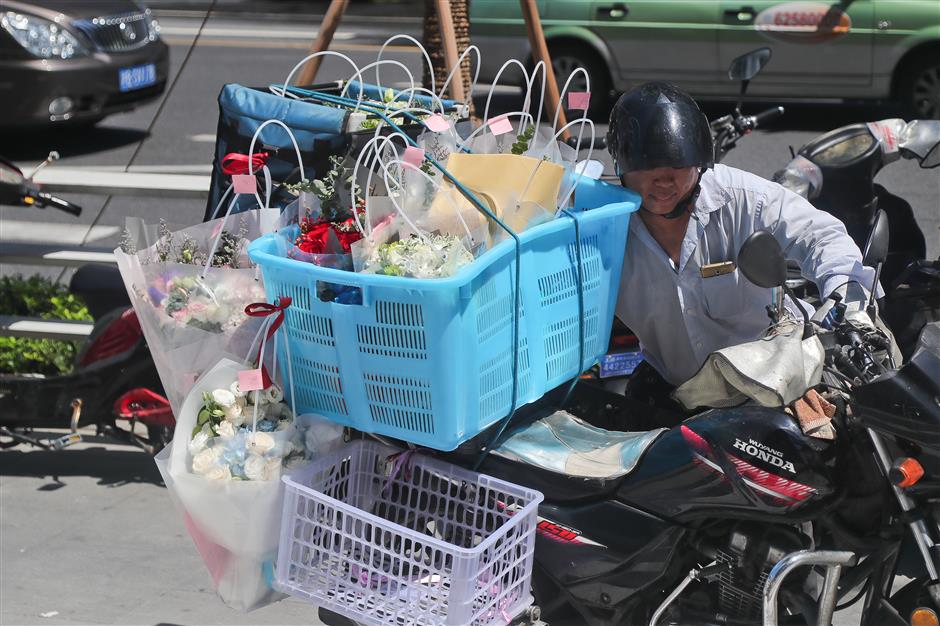Busy day at the marriage registration centers

Tracy Wang (left) and Bryant Zhang pose for photos with their marriage certificates at the marriage registration office in Jing’an District on Monday.
Monday was the day to get married in Shanghai.
A total of 1,414 couples tied the knot across the city on the day, which marked Qixi Festival.
The figure is more than three times higher by comparison to an average day's figure, the city's civil affairs authorities said.
Qixi is the seventh day of the seventh month on the lunar calendar and is also known as Chinese Valentine's Day.
The Pudong New Area marriage registration center was the busiest such center — with 296 couples registered, followed by the districts of Chongming (106) and Minhang (101), according to Shanghai Civil Affairs Bureau.
"I picked Qixi to make the registration about two months ago because it is a romantic festival," said Zhu Jing, who said "I do" at Huangpu District marriage registration center on Monday morning. "It is now one of the most important days in my life and I will celebrate the festival every year from now on.”
At the Jing'an District marriage registration center, Lily Wang, a bride-to-be, and her sweetheart asked for a half-day leave from their companies to register.
"We originally planned to tie the knot at Putuo District registration center, but we found it had no vacancy for reservation. Luckily, there was only one left in Jing'an and we grabbed it without hesitation," Wang said.
"Qixi is the Chinese version of Valentine's Day, and it is meaningful to marry on the day. Moreover, the date August 28 also sounds auspicious."

A flower deliveryman doing his rounds in Shanghai on Monday.
But Monday wasn't so good for the city's flower sellers, who reported no big increase in sales.
At Caojiadu Flower Market, the largest of its kind in downtown and which is scheduled to close by the end of this year, a flower shop owner surnamed Fang said the price of roses did not rise significantly.
The price of a rose was 6 yuan (88 US cents) to 8 yuan today, compared with 5 yuan on normal days at the market, Fang said.
"We had a booming business during this year's (western) Valentine's Day, and men usually don't spend twice buying roses for their sweethearts," he told Shanghai Daily.
"If men did not buy flowers on Valentine's Day, we would have much better business on Qixi," said Fang, adding that business was slack on Monday.
The Qixi Festival, like Valentine's Day in the west, is a time for businesses to promote various products from luxury bags to jewelry.
"To be frank, I don't like the festival because it means I need to prepare a gift for my girlfriend," said Shanghai resident Eric Wang, who was buying a bunch of roses for his girlfriend at Caojiadu Flower Market. "It is a sweet burden."
"There are too many festivals, and I need to remember each of them and prepare gifts every time, which makes me feel tired," he said. "She will not complain if I don't have a gift, but she will be unhappy."
Wang should be in his sweetheart's good books though — he booked a meal at a Japanese restaurant to mark the occasion.
For many middle-aged and seniors, the festival isn't about buying flowers.
Cao Jinhua, 65, said she never celebrates Valentine's Day or Qixi. She came to Caojiadu just to buy some vases. "For people of my age, a plain life is the most treasured. There is no need to prepare roses or other things to express love because love is deeply rooted in our hearts."















